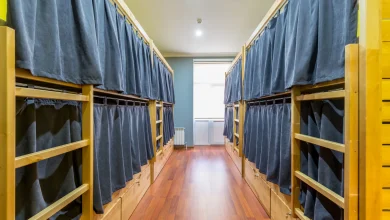Traveling on a budget doesn’t mean sacrificing comfort or missing out on memorable experiences. With a bit of research and some insider tips, you can find affordable accommodation options that suit your needs and preferences. In this blog post, we’ll explore some strategies for finding cheap hotels without compromising on quality.
Table of Contents
Toggle1. Start with Online Booking Platforms
When it comes to finding budget-friendly accommodation, online booking platforms are a traveler’s best friend. These platforms offer a vast array of options, from budget motels to luxury resorts, allowing you to tailor your search according to your preferences and budget constraints. Here’s a deeper dive into how you can leverage online booking platforms to find cheap hotels:
A Wide Range of Options: Online booking platforms aggregate listings from various hotels, guesthouses, hostels, and vacation rentals, giving you access to a diverse range of accommodation options. Whether you’re looking for a cozy bed and breakfast or a budget-friendly hostel dormitory, you’re likely to find it on these platforms.
Advanced Search Filters: These platforms typically offer advanced search filters that allow you to narrow down your options based on specific criteria. You can filter results by price range, location, accommodation type, amenities, and guest ratings. By setting your preferences, you can quickly identify hotels that meet your budget and requirements.
Comparison Tools: Comparison tools provided by online booking platforms allow you to compare prices, amenities, and reviews across multiple hotels simultaneously. This feature is invaluable for budget-conscious travelers who want to ensure they’re getting the best value for their money.
Real-Time Availability and Pricing: Online booking platforms provide real-time information on room availability and pricing, allowing you to book your accommodation instantly. You can take advantage of last-minute deals and special promotions, particularly if you’re flexible with your travel dates.
Guest Reviews and Ratings: Before making a booking, you can read reviews and ratings from previous guests to get insights into their experiences. Pay attention to comments about cleanliness, staff friendliness, location, and overall value for money. This information can help you make an informed decision and avoid unpleasant surprises.
Secure Booking Process: Online booking platforms typically offer secure payment processing, ensuring that your personal and financial information remains protected. You can book with confidence, knowing that your transaction is safe and secure.
Rewards Programs and Loyalty Benefits: Many online booking platforms offer rewards programs or loyalty benefits that allow you to earn points or discounts with each booking. By participating in these programs, you can accumulate rewards that can be redeemed for future stays, saving you even more money in the long run.
In summary, online booking platforms are an invaluable resource for finding cheap hotels. By leveraging their wide range of options, advanced search filters, comparison tools, guest reviews, secure booking process, and rewards programs, you can identify affordable accommodation options that meet your needs and preferences. Happy hunting!
2. Be Flexible with Your Travel Dates
Flexibility with travel dates is a powerful strategy for finding cheap hotels and maximizing your travel budget. Here are some key points to consider when being flexible with your travel dates:
Off-Peak vs. Peak Seasons: Prices for accommodation can vary significantly depending on the time of year. Popular tourist destinations often have peak seasons when demand is high, leading to higher hotel rates. Conversely, off-peak seasons typically offer lower prices as demand decreases. Being flexible with your travel dates allows you to avoid peak seasons and take advantage of lower rates.
Mid-Week vs. Weekend Stays: Weekends are typically peak times for hotel stays, especially in city centers and tourist hotspots. By opting for mid-week stays instead of weekends, you can often find lower rates and better deals. Hotels may offer special discounts and promotions to attract guests during quieter periods.
Consider Shoulder Seasons: Shoulder seasons, which fall between peak and off-peak seasons, can offer a sweet spot for budget-conscious travelers. During shoulder seasons, you can enjoy favorable weather conditions and fewer crowds while still benefiting from lower hotel rates. Research the shoulder seasons for your destination and plan your trip accordingly.
Use Flexible Date Search Tools: Many online booking platforms offer flexible date search tools that allow you to compare prices across different dates. Instead of locking yourself into specific travel dates, use these tools to identify the cheapest days to book your stay. You may find that shifting your travel dates by a few days can result in significant savings.
Monitor Price Fluctuations: Hotel prices can fluctuate based on factors such as demand, availability, and special events. Keep an eye on price trends by monitoring hotel rates over time. Set up price alerts or subscribe to newsletters from online booking platforms to stay informed about price drops and promotions.
Consider Booking Last-Minute: While it’s generally advisable to book accommodation in advance, last-minute deals can sometimes offer substantial savings. Hotels may slash prices to fill empty rooms as the travel date approaches. If you’re comfortable with a bit of uncertainty and spontaneity, consider waiting until the last minute to book your hotel stay.
Be Flexible with Your Destination: If your primary goal is to find cheap accommodation, consider being flexible with your destination. Explore alternative travel destinations that offer similar experiences but at lower prices. You may discover hidden gems and lesser-known destinations that provide excellent value for money.
By being flexible with your travel dates, you can unlock significant savings on hotel accommodation, allowing you to stretch your travel budget further and potentially even afford additional experiences during your trip. Keep an open mind, use flexible date search tools, and consider alternative destinations to make the most of your travel budget.
3. Look for Deals and Discounts
Looking for deals and discounts is a savvy way to save money on hotel stays. Here’s a more detailed look at how you can find and take advantage of these offers:
1. Sign Up for Loyalty Programs: Many hotel chains offer loyalty programs that reward frequent guests with points, discounts, and exclusive perks. Sign up for these programs to access member-only rates and special promotions. Accumulate points with each stay and redeem them for free nights or upgrades in the future.
2. Check Hotel Websites Directly: Don’t rely solely on third-party booking platforms. Visit hotel websites directly to see if they’re offering any exclusive deals or promotions. Hotels often advertise special rates or packages that may not be available elsewhere.
3. Subscribe to Newsletters: Subscribe to newsletters from hotels and booking platforms to receive updates on the latest deals and discounts. Hotels often send out promotional emails with limited-time offers, flash sales, and exclusive discounts for subscribers.
4. Look for Package Deals: Some hotels offer package deals that combine accommodation with other amenities such as meals, spa treatments, or entertainment tickets. These packages can provide excellent value for money compared to booking each component separately.
5. Use Discount Codes and Coupons: Search online for discount codes and coupons that can be applied to hotel bookings. Websites like RetailMeNot and Groupon often feature exclusive deals and promo codes that can help you save on accommodation costs.
6. Take Advantage of Credit Card Benefits: Certain credit cards offer benefits and perks that can be used to save money on hotel stays. Look for credit cards with travel rewards, cashback offers, or statement credits for hotel purchases. Paying with the right credit card can earn you additional savings or rewards points.
7. Consider Last-Minute Deals: If you’re comfortable with spontaneity, consider booking last-minute deals. Hotels may offer steep discounts to fill empty rooms as the check-in date approaches. Use last-minute booking apps or websites to find discounted rates on hotel stays.
8. Book Non-Refundable Rates: Non-refundable rates often come with lower prices compared to flexible rates. If you’re confident about your travel plans and don’t anticipate any changes, consider booking a non-refundable rate to secure additional savings.
9. Look for Price Match Guarantees: Some booking platforms offer price match guarantees, promising to match or beat any lower rate found elsewhere. If you find a better deal on a competing website, reach out to the booking platform and request a price match.
10. Consider Group Booking Discounts: If you’re traveling with a group, inquire about group booking discounts directly with hotels. Group rates are often available for reservations involving a certain number of rooms or guests.
By actively searching for deals and discounts, you can significantly reduce the cost of your hotel stays, allowing you to allocate more of your travel budget to other expenses such as activities, dining, and souvenirs. Keep an eye out for special promotions, loyalty program benefits, and exclusive offers to maximize your savings.
4. Consider Alternative Accommodation Options
Exploring alternative accommodation options can lead to unique and budget-friendly experiences during your travels. Here’s a closer look at some alternative options and how to make the most of them:
1. Hostels: Hostels are a popular choice for budget travelers, especially those seeking a social and communal atmosphere. Hostels typically offer dormitory-style accommodations with shared facilities such as kitchens, common areas, and bathrooms. Private rooms are also available in many hostels for those seeking more privacy. Hostel stays are not only affordable but also provide opportunities to meet fellow travelers and exchange tips and stories.
2. Guesthouses and Bed & Breakfasts (B&Bs): Guesthouses and B&Bs are smaller, often family-run establishments that offer cozy and personalized accommodations. These properties are known for their warm hospitality and homey atmosphere. While prices vary depending on the location and amenities, guesthouses and B&Bs are generally more affordable than traditional hotels. Enjoy homemade breakfasts and insider recommendations from friendly hosts who are passionate about sharing their local knowledge.
3. Vacation Rentals: Vacation rentals, such as apartments, condos, and holiday homes, provide a home-away-from-home experience for travelers. These properties come fully equipped with amenities like kitchens, living areas, and laundry facilities, making them ideal for longer stays or traveling with family or friends. Websites like Airbnb, Vrbo, and HomeAway offer a wide range of vacation rental options at various price points. Look for discounts on weekly or monthly stays to maximize savings.
4. Camping and Glamping: For outdoor enthusiasts and nature lovers, camping and glamping (glamorous camping) offer budget-friendly accommodation options surrounded by natural beauty. Campsites and glamping sites provide facilities such as tents, cabins, or yurts, along with amenities like bathrooms, fire pits, and picnic areas. Camping can be a cost-effective way to explore national parks, beaches, and other scenic destinations. Just be sure to research campsite fees, reservation requirements, and equipment rental options in advance.
5. House Sitting and Home Exchanges: House sitting and home exchanges provide opportunities for free or low-cost accommodation in exchange for taking care of someone else’s home or swapping homes with another traveler. Websites like TrustedHousesitters and HomeExchange connect homeowners with responsible house sitters or exchange partners. House sitting allows you to immerse yourself in local communities and live like a local, while home exchanges offer the chance to experience life in a different city or country without paying for lodging.
6. Farm Stays and Eco-Lodges: Farm stays and eco-lodges offer unique and sustainable accommodation options for travelers seeking immersive experiences in rural or environmentally conscious settings. Stay on a working farm and participate in agricultural activities, or unwind at an off-the-grid eco-lodge nestled in pristine natural surroundings. These accommodations often prioritize sustainability, community engagement, and cultural immersion, providing meaningful connections with the local environment and culture.
7. University Dormitories and Student Housing: During academic breaks, university dormitories and student housing facilities may offer affordable accommodation options for travelers. Check with local universities or colleges to inquire about short-term stays in dormitories or student residences. While basic in terms of amenities, university accommodations can be budget-friendly and conveniently located near campus facilities and public transportation.
By considering alternative accommodation options, you can find affordable and unique places to stay that enhance your travel experience and stretch your budget further. Whether you’re seeking social interactions, cultural immersion, or outdoor adventures, there’s an alternative accommodation option to suit your preferences and interests.
5. Negotiate and Haggle
Negotiating and haggling for better rates on hotel accommodations can be an effective way to save money, especially when booking directly with the hotel. Here are some tips on how to negotiate and haggle for the best possible deal:
1. Call the Hotel Directly: Instead of booking online, call the hotel directly to inquire about room rates. Speaking with a staff member gives you the opportunity to negotiate in real-time and ask about any available discounts or promotions.
2. Be Polite and Courteous: Approach the negotiation process with a friendly and respectful demeanor. Remember that hotel staff are more likely to accommodate your requests if you’re polite and courteous.
3. Mention Competing Offers: If you’ve found lower rates at other hotels or through online booking platforms, politely mention this to the hotel staff. They may be willing to match or beat the competitor’s offer to secure your booking.
4. Highlight Loyalty or Membership Status: If you’re a member of the hotel’s loyalty program or a frequent guest, mention this during the negotiation process. Hotels often offer special discounts or perks to loyal customers as a way of rewarding their repeat business.
5. Inquire About Upgrades or Additional Benefits: If the hotel can’t lower the room rate, ask if they can provide complimentary upgrades or additional benefits instead. This could include perks such as free breakfast, parking, Wi-Fi, or access to amenities like the gym or pool.
6. Be Flexible with Room Types and Dates: If the hotel is unable to offer a discount on your preferred room type or dates, be open to flexibility. Ask if there are cheaper room categories available or if there are specific dates when rates are lower.
7. Negotiate Extras for Longer Stays: If you’re planning an extended stay, negotiate for additional discounts or complimentary services. Hotels may be more willing to offer concessions for longer bookings to secure your business.
8. Timing is Key: Try to negotiate during off-peak hours when hotel staff are less busy and more likely to accommodate your requests. Avoid calling during peak check-in or check-out times when staff may be rushed.
9. Use Tactful Persistence: If the initial response is not favorable, don’t be afraid to politely ask to speak with a manager or supervisor. Sometimes, higher-level staff members have more authority to approve discounts or negotiate rates.
10. Be Prepared to Walk Away: If the hotel is unwilling to negotiate or haggle, be prepared to walk away and explore other accommodation options. Sometimes, simply expressing your willingness to look elsewhere can prompt the hotel to reconsider their stance.
Remember that successful negotiation requires patience, tact, and flexibility. While not every negotiation will result in a discounted rate, it’s always worth asking for a better deal to potentially save money on your hotel stay.
6. Consider Location Carefully
Carefully considering the location of your hotel can have a significant impact on both your experience and your budget. Here’s a deeper look at why location matters and how to make the most of it:
1. Proximity to Attractions and Transportation Hubs: Choose a hotel that is conveniently located near the attractions and activities you plan to visit. This can help you save time and money on transportation costs. Look for hotels within walking distance or a short commute to popular tourist spots, public transportation hubs, and amenities such as restaurants and shops.
2. Safety and Security: Prioritize safety when selecting a hotel location, especially if you’re traveling solo or to unfamiliar destinations. Research the neighborhood to ensure it’s safe and well-lit, particularly if you plan to be out late at night. Reading online reviews and consulting travel guides can provide insights into the safety of different areas.
3. Consider Alternative Neighborhoods: Staying slightly outside the main tourist areas can often result in more affordable accommodation options. Explore alternative neighborhoods that offer good access to transportation and amenities but may have lower hotel rates due to being less touristy. These neighborhoods can also provide a more authentic and immersive travel experience.
4. Accessibility: If you’re traveling with mobility issues or young children, consider the accessibility of the hotel location. Look for hotels with wheelchair ramps, elevators, and other amenities that cater to specific needs. Pay attention to the proximity of public transportation options and the availability of taxis or rideshare services for getting around.
5. Noise Levels and Ambiance: Consider the noise levels and ambiance of the hotel’s surroundings. Avoid hotels located on busy streets, near construction sites, or in nightlife districts if you prefer a quiet and peaceful environment. Conversely, if you enjoy being in the heart of the action, choose a hotel in a lively area with plenty of entertainment options.
6. Budget Considerations: Location can significantly impact hotel prices, with accommodations in prime tourist areas often commanding higher rates. If you’re traveling on a budget, look for hotels in less central locations or neighborhoods that offer better value for money. Keep in mind that transportation costs may offset the savings if the hotel is too far from your desired attractions.
7. Local Culture and Experience: Choosing a hotel in a culturally rich neighborhood can enhance your travel experience and provide opportunities for immersion in the local culture. Consider staying in neighborhoods known for their historical significance, vibrant street markets, or culinary delights. Exploring these areas on foot can lead to memorable encounters and discoveries.
8. Safety and Comfort: Trust your instincts when assessing the safety and comfort of a hotel’s location. If you feel uneasy or uncomfortable in a particular area, it’s better to prioritize your safety and choose a different location, even if it means paying slightly more for accommodation.
By carefully considering the location of your hotel, you can optimize your travel experience, minimize transportation costs, and ensure a safe and enjoyable stay. Whether you prioritize convenience, affordability, or cultural immersion, choosing the right location is key to a successful trip.
7. Read Reviews and Do Your Research
Reading reviews and conducting thorough research before booking a hotel is crucial for ensuring a pleasant and satisfying stay. Here’s why it’s important and how to go about it:
also read this :- Must Visit Places In Saudi Arabia
1. Gain Insights from Previous Guests: Reading reviews allows you to gain valuable insights from previous guests about their experiences at the hotel. Pay attention to comments about cleanliness, comfort, customer service, amenities, and the overall atmosphere. Reviews can provide a more accurate depiction of what to expect compared to hotel descriptions and promotional materials.
2. Identify Potential Issues: Reviews can help you identify potential issues or red flags that may impact your stay. Look for recurring complaints or negative trends mentioned by multiple guests, such as noise disturbances, rude staff, or maintenance issues. These insights can help you make informed decisions and avoid unpleasant surprises.
3. Verify Amenities and Facilities: Reviews can provide confirmation about the accuracy of the hotel’s amenities and facilities. Ensure that the amenities advertised by the hotel, such as Wi-Fi, parking, breakfast, and fitness centers, meet your expectations and requirements. Guest reviews often mention whether these amenities were available and satisfactory during their stay.
4. Assess the Location: Guest reviews often contain valuable information about the hotel’s location and surrounding area. Pay attention to comments about safety, convenience, proximity to attractions, public transportation options, and nearby dining and shopping establishments. This information can help you determine if the hotel’s location aligns with your preferences and itinerary.
5. Evaluate Customer Service: Reviews offer insights into the level of customer service provided by the hotel staff. Look for comments praising helpful and attentive staff members, as well as any issues related to professionalism, responsiveness, or friendliness. Positive interactions with hotel staff can greatly enhance your overall experience.
6. Consider Recent Reviews: Focus on recent reviews to ensure that the information is up-to-date and reflective of the hotel’s current standards. Hotels may undergo changes over time, so recent reviews are more likely to provide accurate assessments of the property.
7. Research Multiple Sources: While online booking platforms often feature guest reviews, consider researching multiple sources for a comprehensive understanding. Explore review websites, travel forums, social media platforms, and blogs to gather diverse perspectives and insights about the hotel.
8. Use Review Aggregators: Consider using review aggregators or meta-search websites that compile reviews from multiple sources into one platform. These platforms allow you to compare ratings and reviews across different websites, making it easier to evaluate the overall reputation of the hotel.
9. Leave Your Own Review: After your stay, consider leaving a review to share your experience with future travelers. Your feedback can help others make informed decisions and contribute to the collective knowledge of the travel community.
By reading reviews and conducting thorough research, you can make informed decisions when booking a hotel and increase the likelihood of a positive and enjoyable stay. Pay attention to the experiences of previous guests, assess the hotel’s amenities and facilities, evaluate its location, and consider the level of customer service provided. Armed with this information, you can choose a hotel that meets your expectations and enhances your travel experience.
Conclusion
Finding cheap hotels doesn’t have to be a daunting task. By using online booking platforms, being flexible with your travel dates, looking for deals and discounts, considering alternative accommodation options, negotiating with hotels, choosing the right location, and doing your research, you can save money on accommodation without sacrificing quality. Happy travels!




